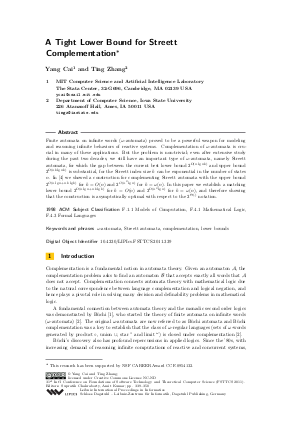A Tight Lower Bound for Streett Complementation
Authors Yang Cai, Ting Zhang
-
Part of:
Volume:
IARCS Annual Conference on Foundations of Software Technology and Theoretical Computer Science (FSTTCS 2011)
Part of: Series: Leibniz International Proceedings in Informatics (LIPIcs)
Part of: Conference: IARCS Annual Conference on Foundations of Software Technology and Theoretical Computer Science (FSTTCS) - License:
 Creative Commons Attribution-NonCommercial-NoDerivs 3.0 Unported license
Creative Commons Attribution-NonCommercial-NoDerivs 3.0 Unported license
- Publication Date: 2011-12-01
File

PDF
LIPIcs.FSTTCS.2011.339.pdf
- Filesize: 480 kB
- 12 pages
Document Identifiers
Subject Classification
Keywords
- omega-automata
- Streett automata
- complementation
- lower bounds
Metrics
- Access Statistics
-
Total Accesses (updated on a weekly basis)
0PDF Downloads0Metadata Views
Abstract
Finite automata on infinite words (omega-automata) proved to be a powerful weapon for modeling and reasoning infinite behaviors of reactive systems. Complementation of omega-automata is crucial in many of these applications. But the problem is non-trivial; even after extensive study during the past two decades, we still have an important type of omega-automata, namely Streett automata, for which the gap between the current best lower bound 2^(Omega(n lg nk)) and upper bound 2^(O (nk lg nk)) is substantial, for the Streett index size k can be exponential in the number of states n. In a previous work we showed a construction for complementing Streett automata with the upper bound 2^(O(n lg n+nk lg k)) for k = O(n) and 2^(O(n^2 lg n)) for k = omega(n). In this paper we establish a matching lower bound 2^(Omega (n lg n+nk lg k)) for k = O(n) and 2^(Omega (n^2 lg n)) for k = omega(n), and therefore showing that the construction is asymptotically optimal with respect to the ^(Theta(.)) notation.
Cite As Get BibTex
Yang Cai and Ting Zhang. A Tight Lower Bound for Streett Complementation. In IARCS Annual Conference on Foundations of Software Technology and Theoretical Computer Science (FSTTCS 2011). Leibniz International Proceedings in Informatics (LIPIcs), Volume 13, pp. 339-350, Schloss Dagstuhl – Leibniz-Zentrum für Informatik (2011)
https://doi.org/10.4230/LIPIcs.FSTTCS.2011.339
BibTex
@InProceedings{cai_et_al:LIPIcs.FSTTCS.2011.339,
author = {Cai, Yang and Zhang, Ting},
title = {{A Tight Lower Bound for Streett Complementation}},
booktitle = {IARCS Annual Conference on Foundations of Software Technology and Theoretical Computer Science (FSTTCS 2011)},
pages = {339--350},
series = {Leibniz International Proceedings in Informatics (LIPIcs)},
ISBN = {978-3-939897-34-7},
ISSN = {1868-8969},
year = {2011},
volume = {13},
editor = {Chakraborty, Supratik and Kumar, Amit},
publisher = {Schloss Dagstuhl -- Leibniz-Zentrum f{\"u}r Informatik},
address = {Dagstuhl, Germany},
URL = {https://drops.dagstuhl.de/entities/document/10.4230/LIPIcs.FSTTCS.2011.339},
URN = {urn:nbn:de:0030-drops-33474},
doi = {10.4230/LIPIcs.FSTTCS.2011.339},
annote = {Keywords: omega-automata, Streett automata, complementation, lower bounds}
}
